The best TV shows of 2020, from The Queen’s Gambit to Normal People
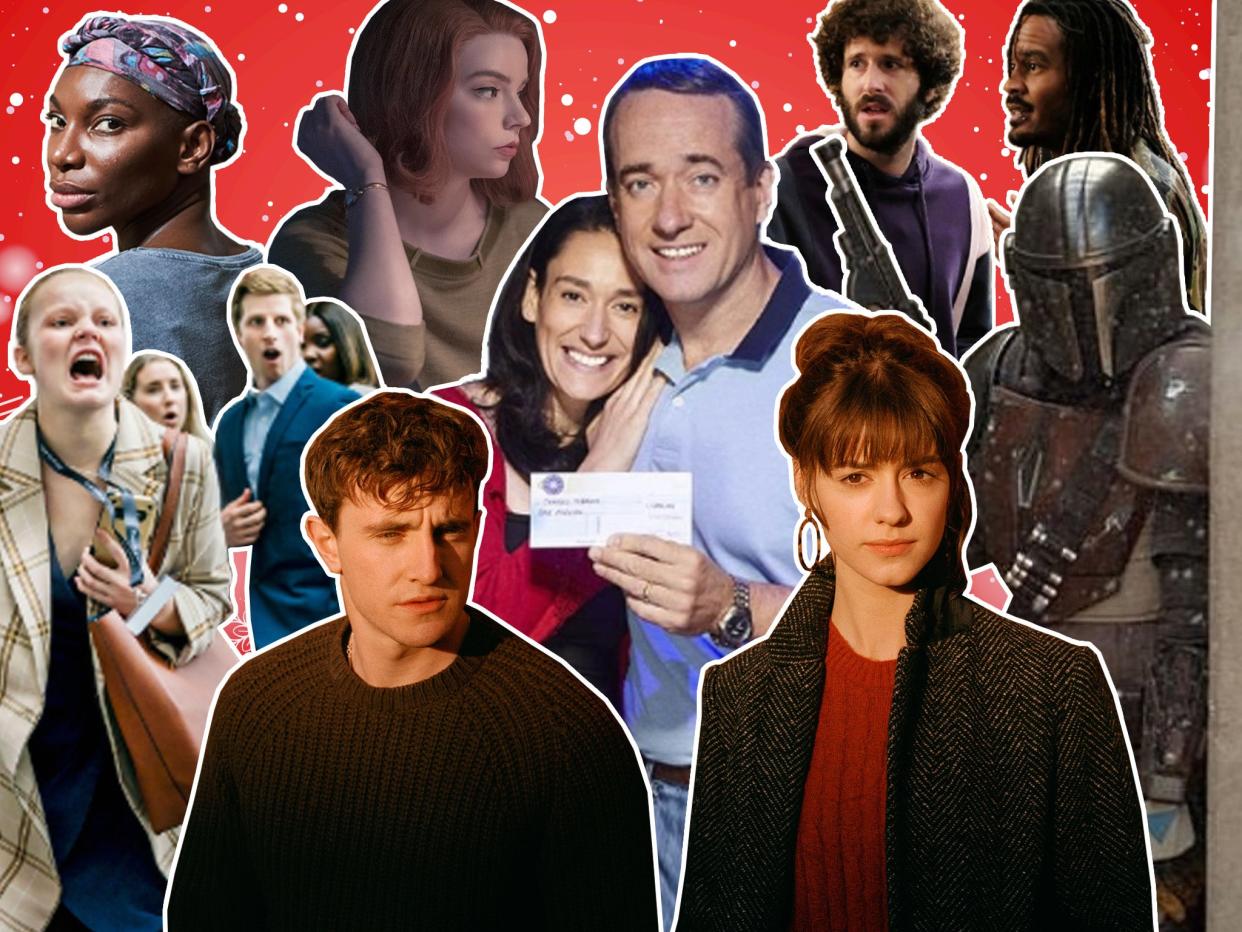
Escapism was the order of the day in 2020. Who can say why? James Graham’s Quiz (ITV) took us back to a time when Chris Tarrant was still visible in primetime and 15 million Brits tuned in to a televised pub quiz. On the BBC, Normal People presented a vision of Ireland in which all teenagers are beautiful poets who go at each other hammer and tongs every hour the Lord sends. Selling Sunset followed aliens from planet ca$h as they flogged vile properties to idiots. The Queen’s Gambit took us to a parallel universe where the leading American chess player of the Cold War was a flame-haired orphan temptress. When actual football stopped, Apple TV+’s charming comedy Ted Lasso portrayed the Premier League as a forgiving environment in which a plucky American could make his way. Steve McQueen's Small Axe anthology was so filmic we've included it in our best films list, rather than here.
Not every new hit was so worthy. As Trump’s vision of America foundered, Netflix viewers couldn’t get enough of Tiger King’s exploitative, rubbernecking peek into the nation’s damaged underclass. To many critics, Emily in Paris was an unwatchable mille-feuille of clichés that insulted the viewer’s intelligence and mocked their abundance of leisure hours. For millions of actual viewers, it was a harmless fantasy about a fictional vision of Paris. It was instantly renewed for a second season. Critics know nothing.
Elsewhere, the bloat was undeniable. Look at Once Upon a Time in Iraq, a human portrait of a terrible war told in less than half the time Netflix took to conclude that Michael Jordan was good at basketball in The Last Dance. It hardly mattered this year, but we’ll never have so much free time again. These streamers need to treat our attention with more respect.
20. Trying (Apple TV+)
The travails of a couple failing to have a baby, and turning to adoption, shouldn’t be a promising topic for a comedy. But although it took a few episodes to get going, the first British comedy on Apple TV+ was unexpectedly charming, with two likeable leads in Rafe Spall and Esther Smith as Jason and Nikki, the couple who are unlucky in fertility but fortunate in each other. It has been recommissioned for a second series, and I wouldn’t be surprised if it builds into a sleeper hit. Apple TV+ could use one, after a mostly disappointing first batch of programmes.
19. The Rise of the Murdoch Dynasty (BBC Two)
Without a new series of Succession, lovers of warring media families had to make do with this three-part BBC documentary that told the real story of the Murdochs, rather than a thinly fictionalised version of it. The film didn’t wear the comparison lightly, even using similar opening credits, But it was a thorough, entertaining account of Rupert Murdoch’s brilliant career, his many controversies, and the looming battle for his inheritance. Necessarily it doubled as a history of political life over the past half century or so. The message was clear: prime ministers come and go, but Murdoch’s power is so enduring that even his incompetent and warring children might be able to keep some of it.
18. The Undoing (HBO/Sky Atlantic)
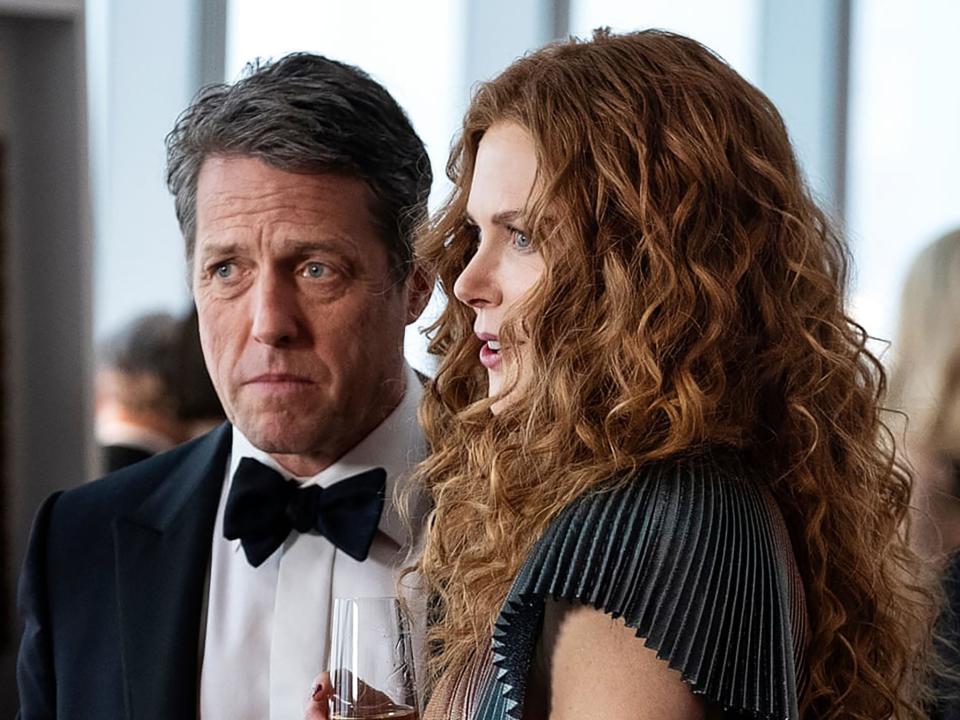
Hugh Grant and Nicole Kidman in The Undoing
Sky/HBOTo ease everyone into Christmas, HBO served up this tasty stew of a murder mystery, made from succulent ingredients. Nicole Kidman was the Manhattan society wife, Grace Fraser, Hugh Grant was her charming English rat of a husband, Jonathan, and Donald Sutherland was her withered tycoon father. Add in the doe-eyed temptress Elena (Matilda De Angelis) and doe-eyed detective Edgar Ramirez and the stage was set for executive-class courtroom antics, but what lifted The Undoing was director Susanne Bier’s thoughtful depiction of New York, which hinted at what was going on outside these rarefied circles.
17. The Good Lord Bird (Showtime/Sky Atlantic)
Ethan Hawke dropped his voice to a gravelly rasp as the brave, moralistic and increasingly unhinged abolitionist John Brown, who picks up a young freed slave boy, Henry Shackleford (Joshua Caleb Johnson). Shackleford narrates their adventures in the build-up to the civil war in a swashbuckling, intelligent, frequently very funny piece of historical fiction that never takes its eye off the present. This year has offered no shortage of reminders that 160 years on, race relations in the US are far from settled, but the series was evidence that the subject matter needn’t preclude small-screen treatments from being entertaining as well as thoughtful.
16. Little Fires Everywhere (Hulu/Amazon Prime Video)
Reese Witherspoon and Kerry Washington faced off against each other as rival mothers in this eight-part adaptation of Celeste Ng’s novel. Witherspoon was Elena Richardson, a rich Stepford-style journalist with four teenage children in 1990s Shaker Heights, Ohio. Washington was Mia Warren, a nomadic artist who arrives one day with her own teenage daughter, setting two worlds on a collision course. What could have risked slipping in to cliché was lifted by complex lead performances and a twisting, adult script.
15. We Are Who We Are (HBO/BBC Three)
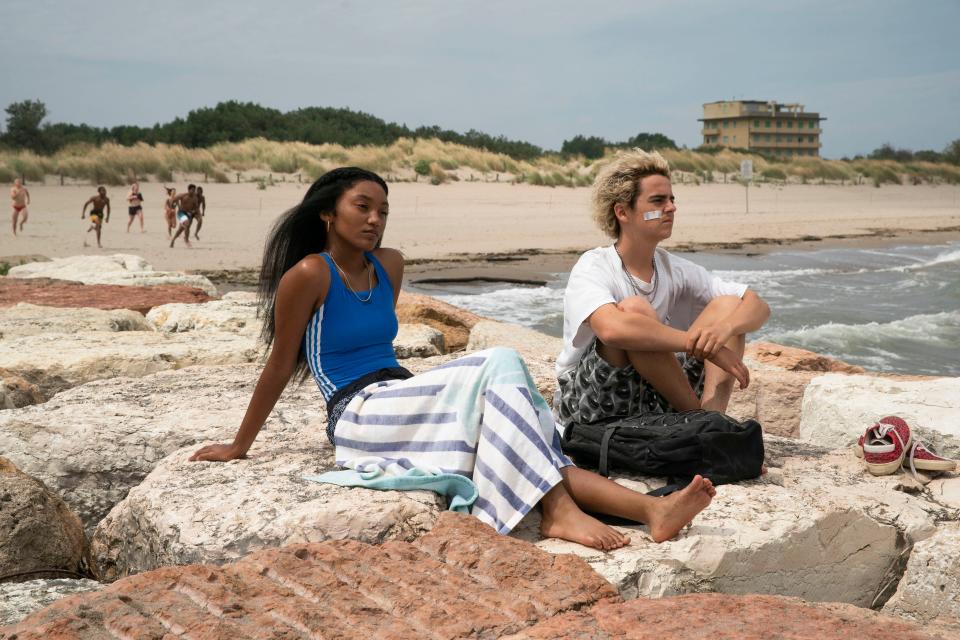
Jordan Kristine Seamón and Jack Dylan Glazer in We Are Who We Are
BBC/FremantleThe Call Me By Your Name director Luca Guadagnino made his television debut with this HBO/Sky Atlantic coming-of-age story set on an American army base just outside Venice. Jack Dylan Glazer and Jordan Kristine Seamón star as the youngsters struggling with their identities, Fraser and Caitlin, while Chloe Sevigny plays Fraser’s mother. As in Guadagnino’s films, the sex and adolescent self-discovery plays out against a gorgeous background, with the director’s eye endlessly compassionate.
14. I Hate Suzie (HBO/Sky Atlantic)
Lucie Prebble and Kirkwood, two of the nation’s most celebrated young playwrights, each wrote TV series this year about troubled female performers. Kirkwood’s was Adult Material (Channel 4), about a porn star in the twilight of her performing career; Prebble’s was I Hate Suzie, which starred Billie Piper as an actor whose career had more than a passing resemblance to Billie Piper’s. Both programmes were worth your time, but I Hate Suzie edged it, a disarmingly frank exhibition of terrible media personalities anchored by a sensitive star turn from Piper.
13. Mrs America (FX/BBC Two)
Like Hugh Grant, Cate Blanchett in recent years seems to have set herself the task of finding unlikeable roles. This year there was Stateless, in which she played a sinister sex cult leader, and then Mrs America, in which she starred as Phyllis Schlafly, the conservative activist who led a backlash against progressive politics in the 1970s, and whose impact is still evident in American politics today. Blanchett’s trick is to make Schlafly a monster you can’t help but admire and she’s ably supported by an ensemble, especially Rose Byrne as the feminist leader Gloria Steinem.
12. Ted Lasso (Apple TV+)
Jason Sudeikis’s comedy about a brash American football coach sent to manage a British soccer team had no right to be good. Aside from anything else, it was based on a short promo film made for NBC in 2013, not a traditional seedbed for comedy. Yet along with its endless supply of fish-out-of-water gags about the offside rule and whether Wales was a separate country, Ted Lasso had a surprising amount of heart. There is something endearing about an earnest trier, as any American could have told us.
11. Unorthodox (Netflix)
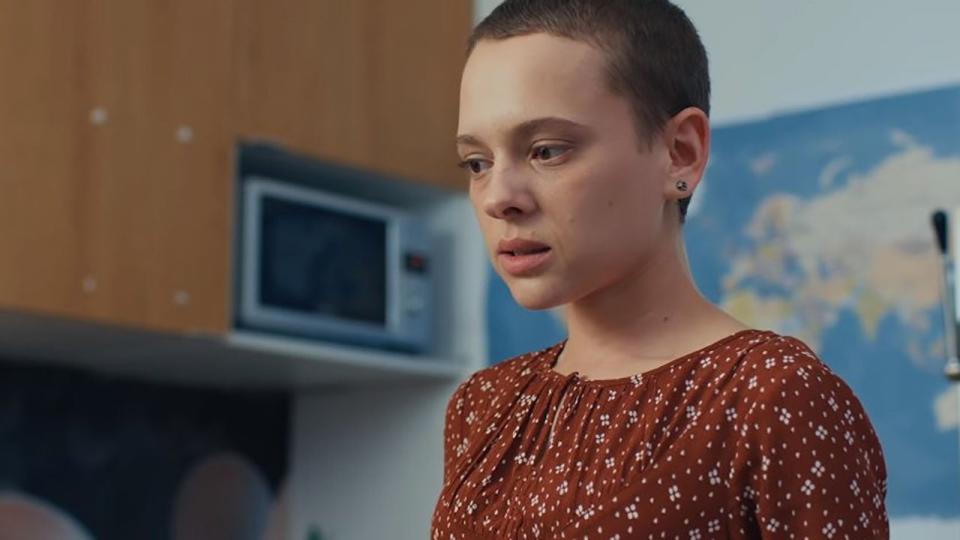
Shira Haas in Unorthodox
NetflixShira Haas delivered arguably the breakthrough performance of the year as Esty, a 19-year-old Hassidic Jew in Netflix’s four-part miniseries, which cracked the lid on a closed and mysterious world. Constricted by her ultra-conservative upbringing in Brooklyn, Esty decides to rebel, fleeing to Berlin where she finds freedom and a group of tolerant, liberal-minded young people. Predictably, her family back home don’t take the abandonment well, and hatch a plan to bring her back. Proof that entertainment can be informative without being hectoring.
10. Devs (FX/BBC Two)
After Annihilation and Ex Machina, Alex Garland continued his journey into high-concept sci-fi with Devs, an ambitious, genuinely cinematic series about a mysterious computer mogul, Forest (Nick Offerman), who seems to have created a machine that can predict the future. Although its reach ultimately exceeded its grasp, Devs looked gorgeous, treated the viewer with unusual intellectual respect, and wasn’t afraid to take on the big philosophical questions emerging from Silicon Valley.
9. The Last Dance (Netflix)
Netflix and ESPN delivered a thrilling examination of one of the most irrepressible sports teams ever assembled, the all-conquering Chicago Bulls basketball side of the early 1990s. The Last Dance is several hours too long, and probably too forgiving of Michael Jordan, but the price of complicity with its star is unparalleled access, interviews with everyone still living who catered, and electrifying archive footage put together beautifully.
8. The Queen’s Gambit (Netflix)
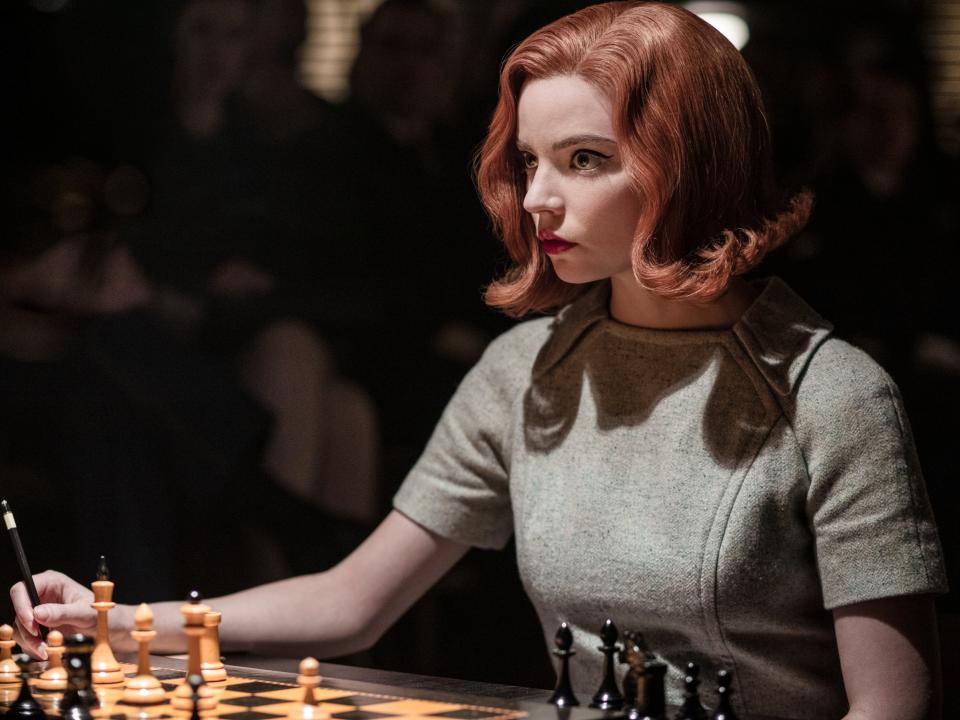
Anya Taylor-Joy in The Queen’s Gambit
Phil Bray/NetflixFrom the outside, Netflix’s most popular new series was also it’s biggest challenge to date; a drama that made chess not only exciting but kind of sexy. It told the story of Beth Harmon (Anya Taylor-Joy), a beautiful red-headed orphan from Kentucky with addiction problems, who rises to the top in a male-dominated world, only needing the help of several men along the way. Critics noted the series’ masculine vision of female empowerment, but it was undeniably easy to watch, Taylor-Joy building a winning performance as she played out tense openings and cagey endgames in a series of opulent mid-century hotels.
7. Once Upon a Time in Iraq (BBC Two)
In an era of big-budget, glitzy blockbuster documentaries - see The Last Dance – this was a masterpiece of patient, devastating filmmaking, which used interviews with figures from both sides, and archive news footage, to tell the story of the Iraq war in five episodes. Beginning with the misplaced optimism before the US invasion in 2003, it took us through insurgency, the death of Saddam Hussein and through to the rise of Isis in the post-war political vacuum. If any doubts remained that the war was a tragic, stupid, destructive misadventure, they weren’t there by the end.
6. Quiz (ITV)
The playwright James Graham’s previous foray into TV, the Benedict Cumberbatch Brexit drama, caused much gnashing of teeth. This time he focused on a less contentious but hardly less fascinating episode in British history, the Who Wants to be a Millionaire coughing scandal. As well as presenting an unexpectedly two-sided view of a case that seemed to be open and shut, Quiz was a vision of a hopeful, early Noughties Britain that came as a lockdown tonic, with a typically sensitive performance by Matthew Macfadyen as the major.
5. Normal People (Hulu/BBC One)

Paul Mescal and Daisy Edgar Jones in Normal People
BBC/Element Pictures/HuluSally Rooney’s bestselling novel about Irish millennials in love was brought to the screen with unusual sensitivity, thanks to a script – by Rooney and the playwright Alice Birch – that gave the story room to breathe. Paul Mescal and Daisy Edgar-Jones had instant chemistry as Connell and Marianne, teenagers from opposite tax brackets who bond over a shared love of literature and contempt for their less industrious peers. Normal People provided dreamlike escapism at exactly the time BBC One needed it, although its abundant and prolonged sex scenes made it a more challenging watch for viewers locked down with their immediate family.
4. The Mandalorian (Disney+)
Although the flagship new Disney+ Star Wars launched in the rest of the world in 2019, Britain didn’t get The Mandalorian until March this year. It was abundantly worth the wait. A stylish western, with an impressive lead performance from the mostly masked Pedro Pascal, it proved Star Wars could ditch the lightsabers without losing the wit and warmth that made it loveable in the first place. All that before we even met Baby Yoda. For all Netflix and Amazon’s forays into original content, Disney+ is proving what can be achieved with a peerless back catalogue and shrewd handling of its IP.
3. Industry (HBO/BBC Two)
I'm friends with the writers, so I held off on Industry when it first came out. Now that everyone from The Daily Mail to The Guardian has five-starred it, I feel more confident I’m not being biased when I say this funny, filthy, fastidiously detailed look at graduates in finance was one of the best new dramas of 2020, with a cast of young, mainly British newcomers, a tight script and a tense, unforgiving vision of London. Or not just biased, anyway.
2. Dave (FX/BBC Two)
Smuggled out late at night on BBC Two earlier this year, Dave was an unexpected word-of-mouth winner, a sharp, zeitgeisty comedy based on the real-life adventures of David Burd, a white Jewish rapper from Pennsylvania who performs as Lil Dicky. Although his lyrics are often funny, he is not a novelty act, and entirely serious about his rap ambitions. Dave had soul to go with its laughs, especially in Dave’s relationship with his real-life hype man, GaTa, who played himself in one of the breakout debuts of the year.
1. I May Destroy You (HBO/BBC One)
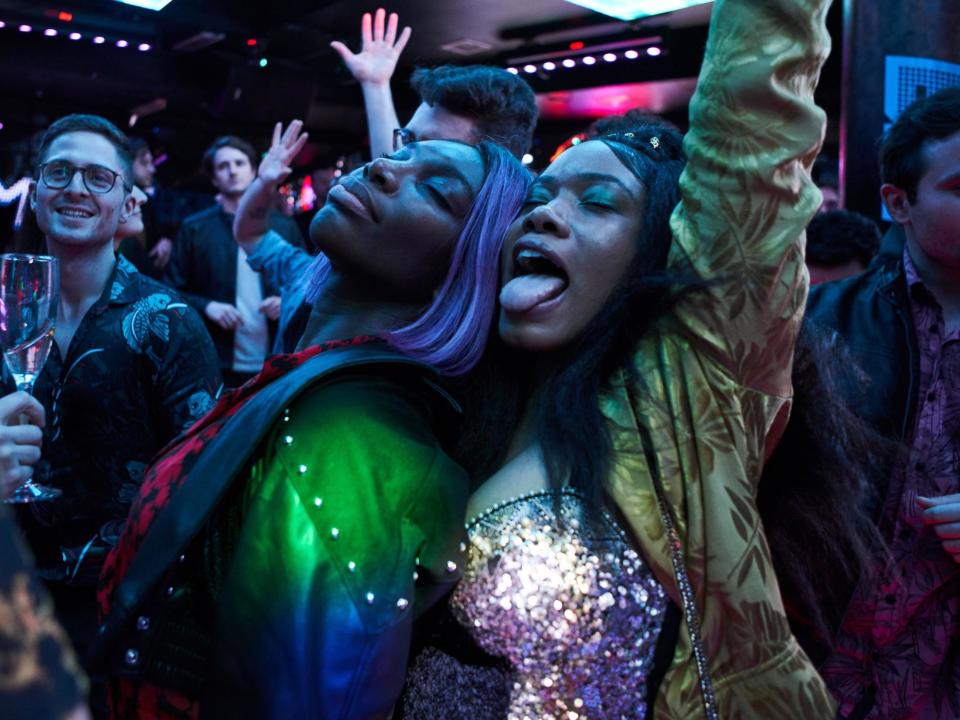
Michaela Coel and Weruche Opia in I May Destroy You
BBCDark, smart, sharp and unexpected, Michaela Coel’s HBO/BBC drama-comedy was an auteur piece, the expression of a single creator’s vision. Written by and starring Coel, it was ostensibly about a writer in London putting her life back together after a rape. But it was much more than that: an exploration of youth, race, gender, sexuality and what it means to live and work in Britain in the 21st century, dished out in 12 half-hour episodes that refused easy answers without sacrificing wit or verve. In interviews for the series Coel revealed how hard she’d had to fight to get the creative control she wanted: not a problem she’ll have again, you imagine.
Read More
Curb Your Enthusiasm at 20: The show that made a schmuck the hero
Myha’la Herrold: ‘Black women have to be undeniable’
A guide to all five episodes of Steve McQueen’s Small Axe series

